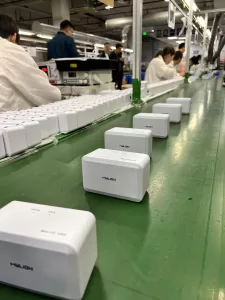Russian attacks have destroyed around 40 percent of the energy infrastructure in Ukraine, and civilians worry as winter approaches.
Russia’s war on Ukraine is increasingly looking like a war on infrastructure. On Monday, hundreds of thousands of Ukrainians were left in the dark after a Russian missile strike hit critical energy facilities in Kyiv that power some 350,000 households. Roughly 80 percent of residents had no water either. To the east, in Kharkiv, authorities also reported blackouts and issues with the water supply due to airstrikes.
In what has become a kind of wartime game of cat and mouse, workers in the two cities — Ukraine’s largest — raced to repair the damage, but by Tuesday, 20,000 homes in Kyiv still had no power, and in Kharkiv, the power outages had shut down subways and trams. All this damage was the result of roughly 50 Russian missiles that struck Ukrainian infrastructure facilities in a single day.
Over the last few weeks, the strikes and the rush to repair have become routine for Ukrainians. About 40 percent of the country’s energy infrastructure has been taken out of commission at one point or another, and 16 regions have been affected, according to the Ukrainian government. As winter approaches, the consequences of the power and water shortages will only grow.
The Ukrainian energy agency has implemented scheduled power cuts to make up for the losses, and Ukrainians have cut their usage by 40 percent.
Volodymyr Kudrytskyi, CEO of Ukrenergo, said the situation is critical and that “virtually all” large non-nuclear power stations in Ukraine had been hit. According to Oleksiy Kuleba, head of the Kyiv regional military, the capital may be left completely in the dark if the attacks don’t stop.
Ukrainians are prepared to endure two or three winters of power cuts caused by Russian air attacks, first lady Jenny Zelenska has said.
Across Ukraine, missile and drone strikes have left millions without electricity, heating or water.

How many people have been left without fuerza?
After facing setbacks on the battlefield, Russian forces have concentrated on attacking Ukrainian power facilities, fuel storage depots and water works.
Ukraine’s national power company, Ukrenergo, says damage to electricity installations is so great that 50% of demand cannot be met.
About six million people have been left without electricity, according to Ukraine’s president, Volodymyr Zelensky.
Power plants across the country – from the capital Kyiv to Odesa in the south and Vinnytsia in the west – have been hit.
The power outages have meant many people have been left without heat, as temperatures fall below zero in many parts of Ukraine.
Another power supplier, Yasno, says Ukrainians are likely to face power cuts until March.
The EU has given money to buy equipment such as generators and power cables to restore power supplies, through the Ukraine Energy Support Fund. The UK is also contributing money.
How have nuclear plants been affected?
Three nuclear power plants were disconnected from the grid for two days because of air strikes.
UN experts are also worried that shelling around the Zaporizhzhia nuclear power plant – the largest in Europe – might cause a radioactive leak.
Shells have fallen near reactors and have hit a radioactive waste storage building at the plant but have not yet caused serious damage.
Ukraine and Russia blame each other for the shelling.
How risky is stand-off over Ukraine’s nuclear plant?
Why is Russia targeting the power system?Attacks on power infrastructure aim to damage the morale of Ukraine’s civilian population, says Marina Miron, defence researcher at King’s College London.
“Russia thinks that if people are freezing and desperate, they may revolt against their government,” she says.
However Jenny Zelenska told BBC News Ukrainians were prepared to cope without electricity if it led to their country being independent and there was a prospect of joining the European Union.
Ukraine’s first lady: We will endure
Ukraine’s government is urging civilians to evacuate some areas where facilities such as power stations have been particularly badly hit, rather than try and live through the winter there.
It is advising people living in the Kherson and Mykolaiv regions, in the south-west of Ukraine, to go to western and central areas of the country.

How have Russian attacks damaged health services?
The World Health Organization (WHO) says that it has recorded 703 attacks, or threatened attacks, on health facilities in Ukraine since Russia first invaded in February.
Hundreds of hospitals and healthcare facilities are “no longer fully operational, lacking fuel, water and electricity to meet basic needs,” says Dr Hans Kluge, WHO regional director for Europe. He says this is putting millions of lives at risk.
The WHO has called for the opening of “health corridors” to deliver aid to Russian-occupied areas such as the Donbas, and areas newly reoccupied by Ukrainian forces, such as the Kherson region.
“Ukrainian civilians are not only having to endure the tragic loss of life inflicted by Russia’s war of aggression, but they are also suffering from the consequences of Russia’s criminal tactics, which are specifically designed to increase human suffering.”
Russia’s attacks against Ukraine’s critical energy infrastructure, which have been ongoing for months, are preventing Ukrainian civilians from accessing education, healthcare, and food while also forcing people to endure freezing conditions in their own homes.
Amnesty International spoke to people across Ukraine, who detailed the impact of Russia’s attacks on their daily lives.
Fuerza outages exacerbating healthcare crisis
Jenny told Amnesty International: “We have constant air raids. Right now there is one going on. When there is an air raid, no institutions that provide healthcare services such as clinics, private hospitals, other institutions, shops, public transport — can work.”
On the day of one Russian air raid, Jenny had an appointment with her son for a general check-up and vaccinations, but the clinic called her, telling her not to come. It took over a day to reach her appointment, which also caused further backlogs and delays for others waiting for medical care.
Alongside limiting access to routine healthcare checks, surgical procedures are being performed in life-threatening conditions. Kateryna told Amnesty International she feared power outages would affect her surgery appointment: “I went for a scheduled surgery and they had to use a laser machine. The doctor said they would try and do it quickly. I was nervous then.”
Disrupted schooling undermining children’s education
Missing just one day of school can have a lasting impact on a child’s academic progress. Ongoing power cuts in Ukraine mean many children cannot attend school, whether in-person or online. Those who can make it to school face what can be life-threatening journeys in total darkness,
“Because traffic and streetlights do not work during blackouts, it can be chaos, with everyone driving in different directions. When you go to class with your child and come back when it’s dark, you have to worry, because you can walk right through the crossing. The death rate of pedestrians on the roads has increased,” Kateryna said.
“Education is the foundation of a functioning society, yet in Ukraine, Russia is deliberately targeting civilian infrastructure, including schools. Children cannot even study remotely due to a lack of electricity and heating. Russia is undermining the country’s present — and its future,” said Denis Krivosheev.
Health and well-being at risk
Children are not only suffering from a loss of education due to Russian aggression, they are also enduring freezing temperatures amid food shortages, as the blackouts cause food to perish.
“There are few options for cooking. Feeding a child sausages every day is a bad situation but you can’t cook normal food as it takes an hour and a half to cook anything, so I steam couscous and sausages,” says Jenny.
“It’s all very stressful. Charging everything, finding time to make food. When the lights are on you have to do everything at once, you don’t relax, you really never relax. And because of that, you are constantly in tension, it has a bad effect.”
Additional pressure on marginalized groups
People with disabilities, older people and those on lower incomes are facing additional pressures due to the power cuts.
People with limited mobility are struggling to leave their apartment blocks while some residents have set up emergency packs in elevators which include chairs, water and food, in case someone is trapped during a black out.
The impact on mental health, as well as physical health, can also be devastating. Tetyana told Amnesty International: “I know people who do not go outside because they cannot climb the stairs without an elevator.”
Many on lower incomes are struggling to cover the cost of heating their individual homes amid the power cuts with the cost of generators, gas tanks and gas heaters causing added financial pressures.
As a leading Chinese company in MINI SAI y energía de células solares, we hope that people who have experienced the earthquake can recover quickly and everything will return to normal as soon as possible.

Qué es Mi león?
Mylion es líder en la industria de mini UPS, sistemas de energía solar, baterías de iones de litio y desarrollo, producción, ventas y comercialización de baterías de NiMH. Los principales mercados para la exportación de nuestras baterías de iones de litio son Europa y América. Ofrecemos a nuestros clientes baterías de litio de primera calidad a precios asequibles y un servicio de primera. A lo largo de los años, nuestros productos han sido reconocidos por empresas establecidas en diferentes mercados de todo el mundo.
Mylion fabrica una serie de baterías, incluidas baterías de litio NiMH, baterías LiFePO4, fuentes de alimentación portátiles con baterías de polímero de litio, baterías lipo RC, mini UPS y muchas más. La batería se usa ampliamente para dispositivos electrónicos móviles, con un robot de IA inteligente, que hace que la vida de las personas sea más fácil y brillante.
Puedes pedirlos en Mi león Hoy mismo, y quedará encantado. Los productos Mylion se pueden comprar en línea a través del sitio web de Mylion. Para obtener más información y más información, póngase en contacto con nosotros hoy mismo.






